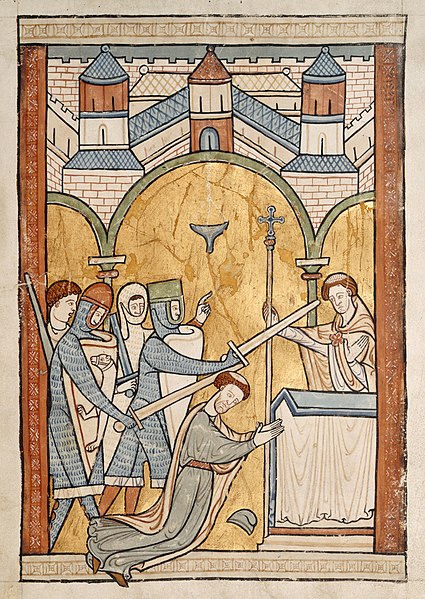
The Murder Of Thomas Becket
Over 850 years have passed since the death of Thomas Becket, who was murdered on the 29th December 1170, yet his assassination remains one of the most well-known murders in early history.
The Rise Of Thomas Becket To Archbishop
Thomas Becket was born c.1120 in London to a family of merchants and, upon finishing school, became a clerk for the Archbishop of Canterbury. He excelled in this role, and it was suggested that King Henry II appoint him as Chancellor of England. The two young men became firm friends, hunting and travelling together frequently, and Becket settled into life at court, enjoying a decadent lifestyle filled with lavish parties and trips to France. When the position of Archbishop of Canterbury became available, following the death of the previous Archbishop in 1161, Becket was put forward for the role and the King, who was keen to command greater authority over the Church, seized the opportunity to appoint his close friend to this powerful position. He was officially consecrated as Archbishop on the 23rd May 1162.
An Argument Between Friends
Despite Henry’s intention that his friend remain Chancellor as well as taking up the post of Archbishop, Becket resigned from the role later that year, causing the two men to quarrel. Other disputes arose as the king became unhappy about his inability to control the Church in the way he’d hoped. Whilst the Church remained loyal to the king, its allegiance lay first and foremost with God and his representative on earth, the Pope, and the clergy were exempt from common law as the Church had their own legal system. Having experienced a religious epiphany following his appointment to the role of Archbishop, Becket supported the rights of the Church, believing that the Church was indeed above the law and, during a confrontation in 1164, the king labelled him a traitor. Becket fled to France after refusing to relinquish his property.
An Inadvertent Order
Becket lived in exile in France for six years. During this time, Henry had his son crowned by the Archbishop of York, to which Becket took great offence. This incident prompted King Henry and Becket to contact each other again and it was agreed that he would return to England to resume his role as Archbishop of Canterbury fully. But Becket, still furious at the great insult that Henry had wrought, excommunicated the Archbishop of York and the Bishops of London and Salisbury who had been involved in the coronation of Henry’s son. Henry was outraged when he heard of this, uttering the words “Will no one rid me of this turbulent priest?!” Four of Henry’s knights took the king’s words in earnest and travelled to Canterbury in search of him.
A Killing Never To Be Forgotten
This murder is so well-known today is because historians have eyewitness accounts of what happened. A man named Edward Grim wrote of how the four knights arrived at Canterbury Cathedral and attempted to arrest Becket, who refused to leave the Cathedral. The knights then burst into the Cathedral shouting “Where is Thomas Becket, traitor to the king and the kingdom?”. Grim also wrote of how the knights tried to drag Becket out of the Cathedral whilst he clung to a pillar. It was then that one knight drew his sword and sliced off the crown of his head before a second, and then a third, blow brought his life to an end.
The Aftermath
Henry was distraught upon hearing the news of his once good friend’s murder, believing that his words were the cause of Becket’s death. In an act of penitence, he starved himself for three days. Becket was buried in the crypt of the cathedral the next day, his final resting place becoming a pilgrimage site for devoted Catholics. After a series of “miracles” occurred at the Cathedral, together with the ex-Archbishop being considered a martyr, Becket was made a saint in February 1173.